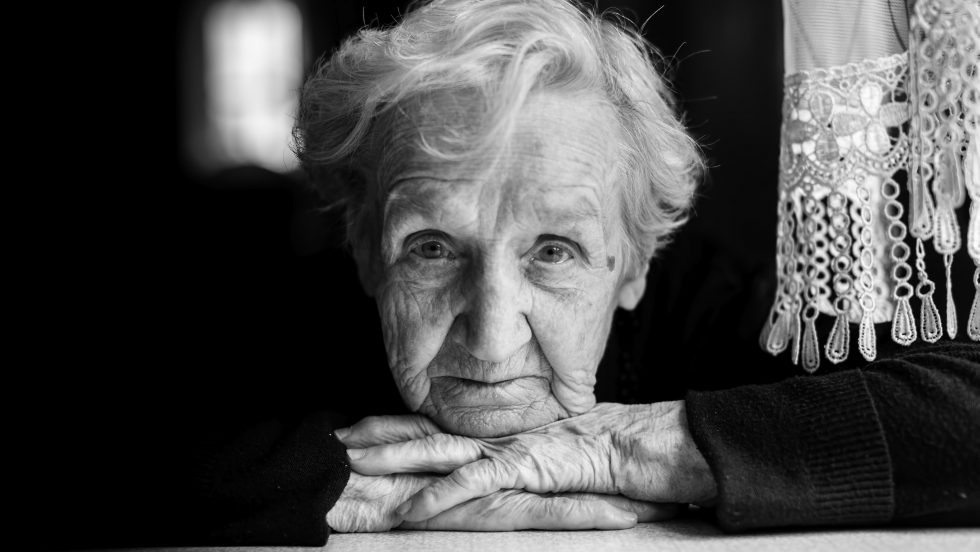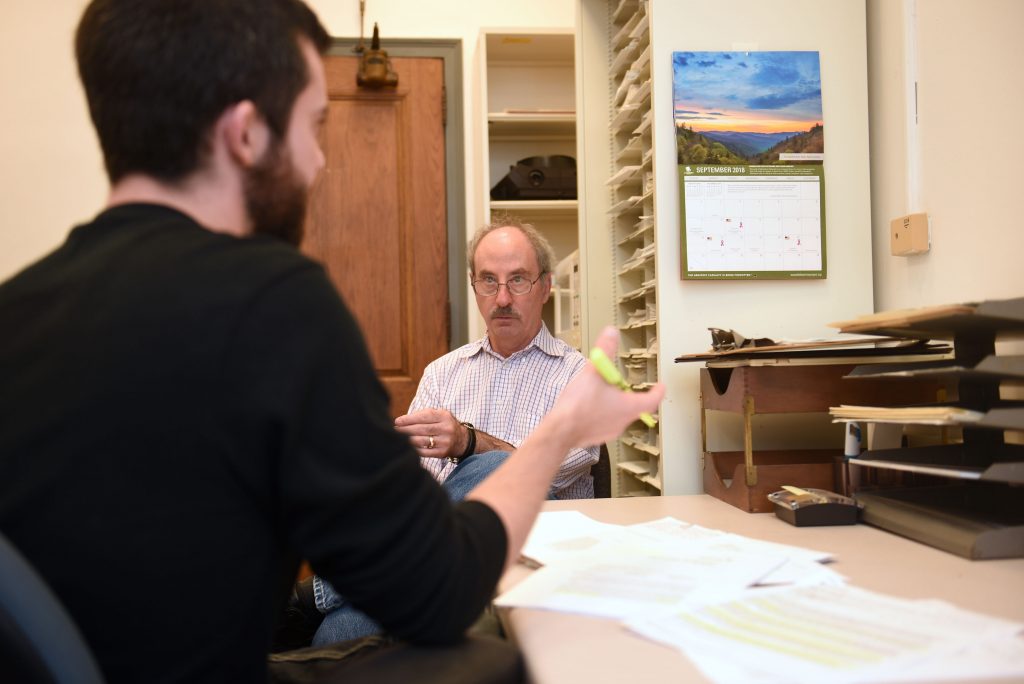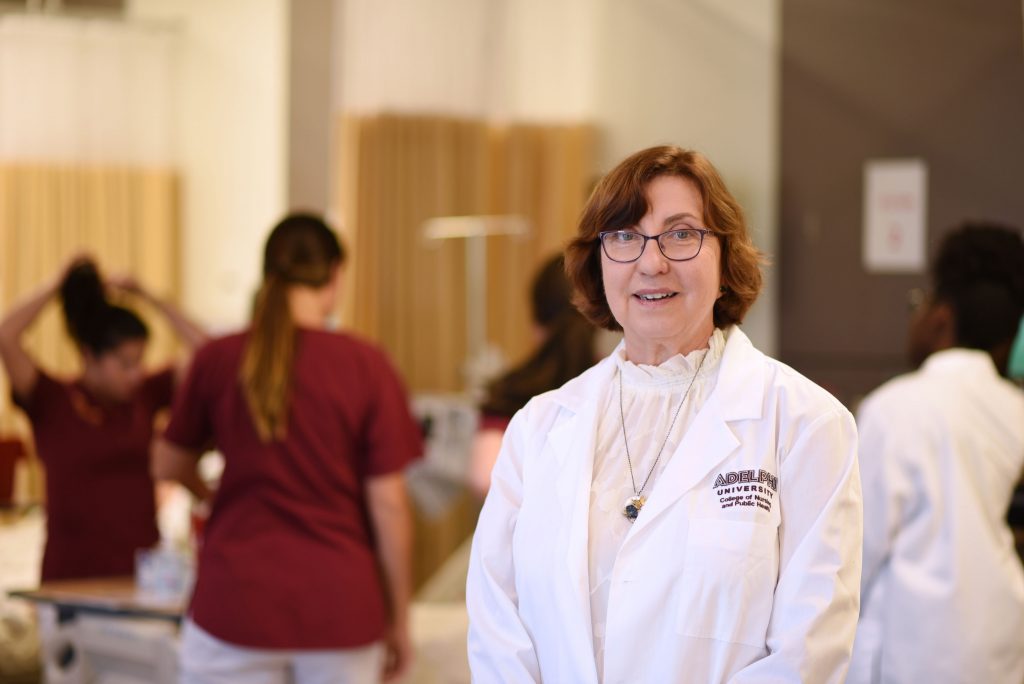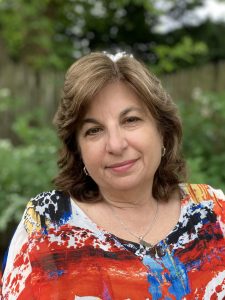
Adelphi researchers challenge long-standing assumptions and break new ground in patient care.
As America’s population ages, a growing number of Adelphi University faculty are redoubling their efforts to correct omissions in aging-related scholarship and patient care.
Katherine Fiori, PhD, associate professor and chair of the Department of Psychology in Adelphi’s Gordon F. Derner School of Psychology, is part of a team challenging decades-old theories about the importance of friendships in aging adults. Susan Zori, DNP, clinical assistant professor, and Beth Heydemann, clinical associate professor, both in the College of Nursing and Public Health, are developing innovative techniques to teach students about caring for elderly patients. And when it comes to elder abuse, Derner Professor Robert Bornstein, PhD—who received the highest honor awarded to Adelphi faculty members when he was named a University Professor in May 2020—knows better than anyone that there are still huge gaps in our knowledge.
Uncovering a new dynamic in elder abuse
Dr. Bornstein, who has been on the faculty of the Derner School since 2006, is one of the unquestioned experts in the field of interpersonal dependency, having studied aspects of dependency and its role in abuse for more than three decades. “Synergistic dependencies in partner and elder abuse,” published in the September 2019 issue of American Psychologist, confronts “long-standing stereotypes about gendered behavior, unstated assumptions regarding relationship dynamics and cultural biases that have resulted in no quantitative data about certain groups.” The article also identifies multiple areas where virtually no research has been conducted—research that is critical, he believes, to better understanding elder abuse.
“Over the years, we have been looking into what we came to call ‘active dependency,’ ” said Dr. Bornstein, who is one of only three University Professors on Adelphi’s faculty. “Because it plays a role in child abuse and partner abuse, we decided to investigate whether a similar dynamic also exists in elder abuse.”
One particular dynamic underlying elder abuse he identified involves a “synergistic dependency” between an older person and a caregiver, often a parent and an adult child. The parent relies on the child for their medical needs, while the child relies on the parent for financial support. “This mutual dependency results in a situation that may quickly become toxic,” Dr. Bornstein said. “The financially dependent family member becomes overwhelmed by the responsibility, by the stress of caregiving. They momentarily lose control.”
Dr. Bornstein suggests that the synergistic dependencies he identified may be particularly important during the COVID-19 pandemic as family members quarantine together at home. “We know that there have been increases in partner abuse during the past several months,” he noted, “and it is likely that there have been increases in elder abuse as well—though, as is often the case with elder maltreatment, these incidents may go unreported.”

Robert Bornstein, PhD, conducts research on the conceptualization and assessment of personality pathology, multimethod assessment and test score integration, and the dynamics of interpersonal dependency and dependent personality disorder, working with findings from within and outside psychology.
While most research defaults to positioning men as abusers, there’s no evidence to suggest that women are not capable of the same. “Every published study on dependency and partner abuse is a study of abusive men,” Dr. Bornstein explained. “That is based purely on long-standing stereotypes held by almost everyone, including most mental health professionals. In fact, a fairly high percentage of abuse is perpetrated by women. The literature has not caught up with that.”
Similarly, when the abuse involves partners, the existing research focuses almost exclusively on opposite-sex couples. “There’s every reason to believe that same interpersonal dynamic plays itself out in same-sex couples, but it’s never been examined,” he said. “It always takes years for research to catch up with social change.”
Although Dr. Bornstein is the sole author of this article, more than 60 undergraduate and graduate students have co-authored papers with him over the years. “It’s literally transformative,” he said. “The experience changes the course of their careers. I truly believe that Adelphi engages our students in ways that make a lifelong impact.”
Fallon Kane ’16, now a doctoral student in the Derner School of Psychology, has continued to collaborate with Dr. Bornstein throughout her undergraduate and graduate studies, citing the opportunity to conduct important research alongside a renowned scholar. “Dr. Bornstein is the first person who ever called me an expert in something,” she said. “That gave me a lot of confidence for my research career moving forward.” In turn, Dr. Bornstein reports that Kane’s work—particularly her forthcoming dissertation on the impact of age and gender biases in personality disorder diagnosis—influenced lines of thought in his latest article.
Adam Natoli, PhD ’20, a doctoral graduate of the Derner program, calls Dr. Bornstein a “phenomenal mentor in every sense of the word.” Dr. Natoli began working closely with him even before joining the doctoral program. “His advice has helped me approach research differently, to think about the utility of my work and not just whether or not it can get published,” he recalled. “He also taught me to think of my research as a narrative, which has helped me establish a strong program of research with a clear trajectory.”
According to Provost Steve Everett, DMA, Dr. Bornstein’s efforts to involve students in his work—including sharing credit for major works of scholarship—presented a strong case for his appointment as University Professor. “Often, when you have someone this prolific, someone with this kind of level of productivity as a researcher, there’s not as much emphasis on teaching,” he said. “For Dr. Bornstein, it is exactly the opposite.”
Dr. Bornstein’s prodigious body of work was also noted by the approval committees. Over the course of his career, he has written nine books, contributed chapters to 66 others and authored dozens of published articles that have earned more than 15,000 citations. This output, said Dr. Everett, puts the scholar “in a league of his own.”
Like the rest of Dr. Bornstein’s research, “Synergistic Dependencies in Partner and Elder Abuse” offers noteworthy implications for health and social policy as well as social justice. “The mutual dependence documented in many cases of elder abuse was a bit of a surprise,” he said. “In some ways, it’s consistent with other types of abuse, and in others it’s different, which we did not anticipate. It points toward all the research we still need to do on the topic.”
The importance of friendships for aging adults
Nuclear and extended families are widely acknowledged as crucial support systems for aging adults. But what about friends and acquaintances? Life-span developmental psychologist Katherine Fiori, PhD, explored rapidly changing sources of support for seniors in “The Increasing Importance of Friendship in Late Life: Understanding the Role of Sociohistorical Context in Social Development,” in the journal Gerontology. The article was co-authored by Tim Windsor, PhD, associate professor at Flinders University in Adelaide, Australia, and Oliver Huxhold, PhD, a researcher at the German Centre of Gerontology in Berlin, Germany.
“There are a couple of theories of social contacts among older people that have been around since the ’90s,” said Dr. Fiori. “One of the most popular is ‘socioemotional selectivity theory,’ pioneered by the scholar Laura Carstensen [PhD]. Her theory is that, across the adult life span, our motivations around social contacts shift as we age.”
In her influential “Evidence for a Life-Span Theory of Socioemotional Selectivity,” published in Current Directions in Psychological Science in October 1995, Dr. Carstensen argues that older adults “grow increasingly selective in their choices of social partners,” choosing to maintain fewer friendships in favor of close family relationships.
“There’s a reason why Dr. Carstensen’s theory is so popular, and that’s because it’s so easily testable,” Dr. Fiori said. “It’s a nice theory, but it doesn’t take context into account. What we were trying to do is introduce a model that explains changes in social networks over time while also considering context.”
Friendships have become increasingly vital to the subjective well-being of older adults due to a variety of demographic changes. Dr. Fiori and her co-authors argue that sociohistorical context influences this phenomenon in three important ways: social opportunity (such as living in an urban versus a rural area), time and energy (retirement allowing for more social interactions), and capacity and motivations (increased life expectancies encouraging more friendships).
“It’s now becoming more socially acceptable for people, especially older adults, to invest resources into non-kin ties,” Dr. Fiori said. “And gender norms are evolving, so it’s more normative for people to have opposite-sex ties that are not romantic relationships.” LGBTQ+ older adults are also more likely to develop “intentional families” or “friendship families” for both support and caregiving needs. These “chosen kin” may share values that strengthen friendships.
Along with Dr. Huxhold and two other colleagues, Dr. Fiori challenged another of Dr. Carstensen’s arguments in “The Strength of Weaker Ties: An Underexplored Resource for Maintaining Emotional Well-Being in Later Life,” published this year in The Journals of Gerontology. It examines the links between changes in social ties and changes in emotional well-being in older adults, disputing previous speculation that a reliance on close emotional ties—such as spouses—is beneficial for well-being later in life.
“This work is important because Dr. Carstensen’s assumptions have never really been tested,” Dr. Fiori said. Deploying data collected over a 23-year period, the study showed that having a larger number of weaker ties—such as friendships—was more strongly predictive of increases in positive affect as well as decreases in negative affect. “Contrary to popular theoretical orientations in gerontology,” the authors concluded, “weaker ties may offer older adults a more effective avenue for promoting emotional well-being over time than close ties, [with] the additional benefit of compensating for losses in the number of close ties.”
New methods of teaching nursing students about aging
In the College of Nursing and Public Health, Dr. Zori and Heydemann have devised groundbreaking ways to teach nursing students about the issues faced by an aging population. They detailed several best practices in “High Impact Practices in a Care of the Older Adult Course,” scheduled for publication in Nursing Education Perspectives in the fall of 2020.
Twelve years ago, when Heydemann had the opportunity to design the College’s first course focused on treatments for seniors, there were very few examples she could follow. “When we went to nursing school, there were no dedicated courses about the care of older adults,” she said. “I started going to meetings at other universities to find out what they were doing.” Drawing on the recommendation of the American Association of Colleges of Nursing, she created a comprehensive curriculum focused on the population’s physical, emotional, socioeconomic and psychosocial needs.

Susan Zori, DNP, conducts research in the areas of nursing education and critical thinking in the nursing profession. Her work as an educator is focused on nursing leadership and patient-centered care.
Several years later, Dr. Zori joined the faculty at Adelphi. After working in critical care departments at some of the region’s biggest hospitals, she was especially interested in recent research on high-impact, real-world educational practices. “It just made sense that students should be going out into the community,” she said.
One exercise already employed in the classroom was the “brown bag review,” which involves examining all medications—prescription, nonprescription and herbal—an older person is currently taking and creating a complete medication list. The exercise trains students to spot expired medications, identify polypharmacy (the regular use of multiple medications) and check for adherence (the extent to which patients regularly take medication as prescribed by their doctors).

Beth Heydemann is chief nurse practitioner at NYU Winthrop Hospital for the Department of Cardiothoracic Surgery.
Reviewing the curriculum for the course, Dr. Zori and Heydemann decided that students should each conduct the review with an older person in their home. Along with the complete medication list, students conduct a standardized assessment for mental acuity, evaluate patients’ knowledge of their medications and judge their ability to read labels and open bottles. This exercise sharpened students’ communication and assessment skills through a high-impact learning process. As students debriefed and shared information—that some older adults were on top of managing their medications, while others were lost—they realized they could make a difference in promoting safer medication practices.
Still working in a clinical setting at the time, Dr. Zori began wondering how to teach students about the medical innovations that were revolutionizing hospitals. She developed a classroom assignment that asked students to draw on what they had learned throughout the semester and propose new products to meet the needs of older patients.
The assignment became so popular that it transformed into a competition based on the television show Shark Tank. Students would break up into small groups and pitch a product they felt would be viable in the marketplace. After an intense question-and-answer period, they would be judged according to criteria such as viability and competitive advantage. Products ranged from smart canes that would warn a user of obstacles to virtual reality headsets designed to help patients interact with faraway family members to household robots to manage medications. “Our knowledge about this segment of the population is evolving,” Dr. Zori said. “So it makes sense that the work we do here at Adelphi is evolving at the same time.”
Looking to the future
Despite differences in focus, Adelphi faculty members studying aging populations share a common perspective: The work is far from finished.
Dr. Fiori and her team are currently working on another article that outlines more fully their theoretical model regarding the development of social relationships in adulthood.
For Dr. Bornstein, questions raised by his recent research provide a valuable opportunity to collaborate once more with Adelphi students. “Our department is doing great work, but we can only do great work by engaging our students,” he said. “I wouldn’t do the research if I couldn’t involve students.”
Bornstein, R. F. “Synergistic dependencies in partner and elder abuse.” American Psychologist, vol. 74, iss. 6, 2019, pp. 713–24.
Fiori, K., Tim Windsor, and Oliver Huxhold. “The Increasing Importance of Friendship in Late Life: Understanding the Role of Sociohistorical Context in Social Development.” Gerontology, vol. 66, February 2020, pp. 1-9.
Huxhold, O., Katherine L. Fiori, Noah J. Webster, and Toni C. Antonucci. “The Strength of Weaker Ties: An Underexplored Resource for Maintaining Emotional Well-Being in Later Life.” The Journals of Gerontology: Series B, February 2020.
“High Impact Practices in a Care of the Older Adult Course,” Nursing Education Perspectives. In Press.